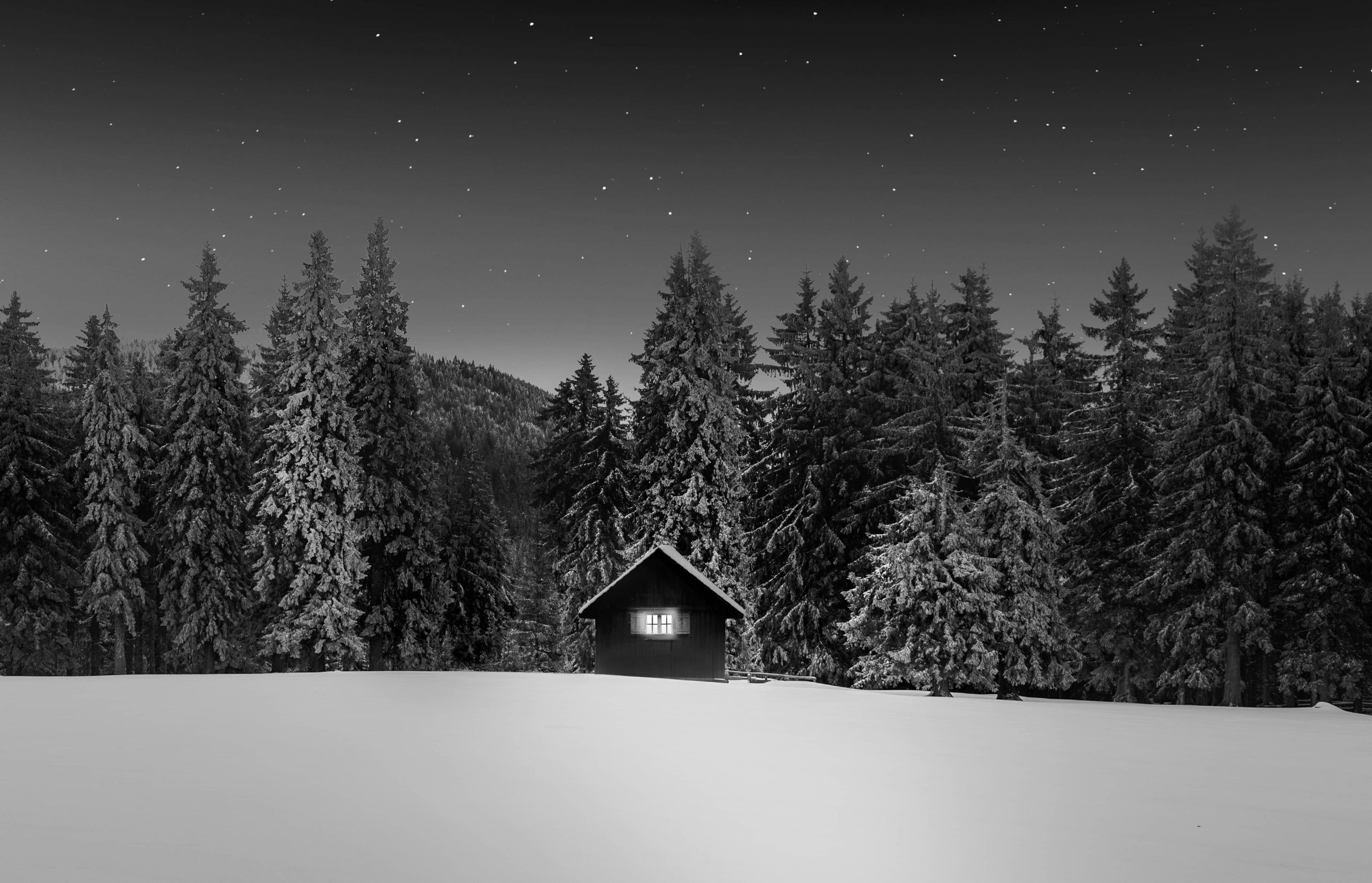The coyotes have been bolder this winter than I’ve ever seen them before. As each night grows colder, and darker, and longer, they push in a little farther past the city limits. The Department of Wildlife blames an unchecked boom in their population, coupled with the fact that garbage cans and the occasional Pomeranian make for decidedly easier meals than hunting in heavy snow. On nights like this, though, I stand in my doorway, with a sweater and a cigarette, listening to their yapping and yowling, knowing I’ll sleep like a stone. I’m certain that I’m the only person in town who welcomes their encroachment, because I’m the only one who knows what comes when their sounds stop.
I was a member of the last generation of truly free-range American children. Brought up by my grandparents in the foothills of the Appalachians, I was left, more or less, to my own devices, so long as I wasn’t underfoot. As such, I made it a point to be underfoot as little as possible. I had just a shade under eighty acres at my disposal, from the woods along the southern edge to the cornfields in the north, and from the railroad tracks on the west of us to the highway in the east. I knew every inch of the ground that lay between those borders, and every inch of that ground was mine, as far as I was concerned.
The rules laid out for me in those days were few, and, looking back, they were almost evenly split between those of practical origin and those that were plainly superstitious. That was a distinction, however, that I had never thought to make. “Stay out of the neighbor’s corn field,” for example, was never any different from, “Keep a silver dollar in your left pocket and a pinch of salt in your right.” You never wear your shoes in the creek, and you never pick the last apple from the tree. If you hear your name in the winter, you never, ever go.
I followed all of those rules to the best of my ability, and honestly, better than anyone had any right to expect from an unsupervised eleven-year-old with a world sprawling out around him. I’ll admit now, though, that I ruined more than a few pairs of shoes in that creek.
Sundown always seemed to carry a certain weight there, with the red of the sky serving as a warning not to be caught too far from home. Often, I’d find myself running a race against the dark as it settled in, from the tracks or from the tree line, across the property, to the house. Once there, I’d sit on the picnic table, under the porch light’s pale orange glow, and I’d listen to the sounds of nightfall as they filled the air around me. In the summer, that meant nightbirds and tree frogs, and always a freight train in the distance. In the winter, though, those birds would roost, and the train schedules were sparse, so as the nights grew colder, darker, and longer, the only sound was the coyotes.
They clustered more in the winter, and they hunted earlier in the evenings, their chorus becoming a cacophony as they moved in alongside the dark. That yapping and yowling would grow around me, punctuated by the screams and squeals of whatever they happened to catch. It would grow so loud and frantic sometimes that I would clamp my hands tight over my ears and beg for the sounds to stop.
Then, on that night in late November, they did.
All sound cut out in an instant, and for the first time in my life, and the last time I can remember, I found myself sitting in true and total silence. As cold as it was that evening, I know the temperature had little to do with the shiver that went through me then. That silence was an invasive species. It didn’t belong there, in my world, and it hadn’t come from my woods, and every moment spent in that silence felt more wrong than the moment before it.
The wind rose, and the sound of that wind came as some relief at first, until the sound of that wind became a whisper, and that whisper became a voice. That voice carried with it a word, and that word —which every instinct I had begged me not to hear —was a name.
My name.
The wind, and the voice, and the word grew louder, drowning out the thought in my head that I was trying so hard to cling to.
“If you hear your name in the winter…”
I tried to finish the sentence, and to stop myself from going, but my feet were already moving, and I was left with no say in the matter. I couldn’t be sure anymore if the voice was carried on the wind or if it was inside my own head, but as long as it called, my feet followed, past the timberline at the edge of my land and into the southern woods.
I followed even after a shift in the wind brought in the driving snow, and I wasted every ounce of effort I had on trying to turn myself back.
I followed even after the woods that I knew gave way to woods that I didn’t, where the white oaks and red maples stopped, and the trees that took their place were things for which I had no names. Every trunk was twisted, and every branch intertwined. There was no color to these trees. There was no color in these woods at all. There was no movement that I could see, but I was sure, if not quite certain, that I could feel those tangled limbs pulse and writhe as I passed beneath and between them. The deeper into those woods that I went, the tighter the gnarled, colorless things crowded the path that I walked, and I wondered just how far I could go before they closed me in completely.
They let me pass, but they took away the moon that had been lighting my path. They took away the driving snow that had been stinging at my face. They even took away the cold that had been burning in my lungs. They took away my sight and my senses. They took away the world, but I walked every inch of that new ground until I couldn’t quite be sure if there was still ground underfoot.
I walked until there was nothing left.
Nothing at all.
And, then, I stood.
I stood in all of that nothing, and there was only that voice and that word.
There was only that name.
My name.
There was so much that I heard in that name—more than just the syllables I knew. In every utterance, I could feel the thing that lay behind the voice, and that thing made no attempt at all toward disguising its intent.
It said my name, and I knew that I would never see color again.
It sang my name, and I knew that I belonged there in the nothing.
It sobbed my name, and I felt time pass from minutes into lifetimes.
It whispered my name, and I felt its breath across my neck as it spoke.
That name wasn’t carried on the wind, and it wasn’t in my head. It came from something that stood with me, there, inside the nothing. I could feel a hand like deadfall resting on my shoulder. I could feel the thing standing over me. I could feel its eyes staring down.
But I would not turn to see it.
I closed my eyes, and I clenched them hard—so tightly that they burned—and every thought and all of the will I had went to keeping my face pointed forward. Whatever it was, it had brought me to it, but it could not make me look.
The voice became insistent, and it said the name again, as a finger like a hedge-wood branch ran along my face. Tears were building behind my eyes, and pressure was building with them, and that pressure threatened to force my eyes open or burst them in their sockets.
But they didn’t open, and they didn’t burst, and I didn’t let them budge, even when that hand went around my throat and that voice became a scream. Even when it chanted the word—for minutes, or for hours, or for lifetimes—until I’d heard those syllables so many times that they lost any meaning they’d ever had. Until it wasn’t my name at all anymore. Until it wasn’t a word or a voice. Until it wasn’t even a whisper. Until it wasn’t even the wind. Until that hand dropped from my shoulder and the thing to which it belonged seemed like nothing more than the nothing in which I stood.
Even then, I didn’t open my eyes, and I didn’t turn to see.
My hands went into my pockets, out of reflex as much as anything, and my left hand palmed that silver coin as my right hand threw the salt.
The scream that came filled the nothing, and the nothing shattered around me, and I knew then for a solid fact that there was no ground under foot.
I didn’t know how long I’d been falling, and I didn’t know where I might land, but I didn’t let my eyes open again until I hit the ground so hard that the thud took the air from my lungs. I gasped to fill those lungs, and as I did, they burned with the cold, and I felt the sting of the snow against the bare skin of my face.
I knew this wasn’t the nothing.
I knew exactly where I lay.
When I let my eyes crack open, they filled with the porch light’s pale orange glow, and it warmed me like a fire as I drank its color in. I listened to the sound of the wind, and it wasn’t that name that I heard, but the yapping and yowling of what must have been every coyote in the county.
Now, even with thirty-one years and eight hundred miles between the Appalachians and myself, I stand under a pale orange light, and I palm that same silver coin, and I listen to the coyotes, and I hope their sounds never stop.

